The best project management certification courses for small businesses cover everything from basic principles and methodologies to in-demand skills and the latest industry trends. And they’re available through reputable organizations like the Project Management Institute and the American Academy of Project Management.
Candidates must meet eligibility criteria around their educational background, minimum project experience, and required training hours. Course prices range from $20 to $2,000 for exams, course materials, and specialized training.
1. Project Management Professional (PMP)

The Professional Management Professional (PMP) is a widely recognized project management professional certification from the Project Management Institute (PMI). This certification is designed for project managers seeking to demonstrate an understanding of the different development approaches, market trends, and emerging technology surrounding project management.
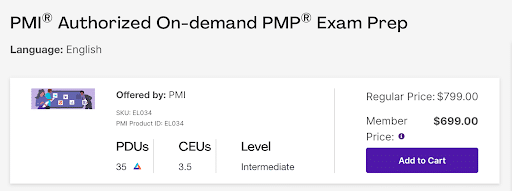
PMI offers an on-demand course to prepare for the PMP exam. (Source: PMI)
The PMP’s stringent requirements have earned it a reputation as the “gold standard” in project management. Candidates need several years of relevant project experience and 35 hours of PMP training before taking the exam.
Passing the exam demonstrates the individual’s proficiency in different project methodologies, such as agile, hybrid, and predictive, as well as their ability to motivate teams through all project phases.
According to a survey by PMI, PMP-certified individuals across 21 countries report considerable earnings after obtaining the certification. Their median annual salaries are, on average, 33% higher than those without it. This demonstrates that earning a PMP certification contributes significantly to both professional development and salary growth.
2. Certified Associate in Project Management (CAPM)

The Certified Associate in Project Management (CAPM) is another project management certificate offered by PMI, focusing on project management fundamentals and core concepts. Earning this certification prepares entry-level project practitioners with all the foundational knowledge and skills to manage large-scale projects and handle complex responsibilities.
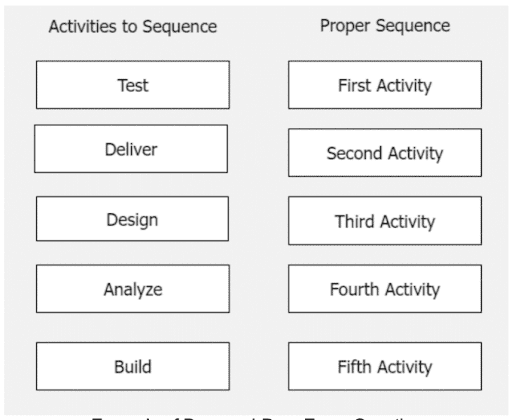
The CAPM exam features drag-and-drop-style questions. (Source: PMI)
A CAPM certification positions candidates to meet the criteria of major certifications, such as the PMP. When pursuing a new career, a CAPM-holder can aim for project leader roles, such as project manager and project coordinator.
In its latest update, PMI has incorporated concepts of the agile framework, business analysis, and predictive plan-based methodologies. Unlike the PMP, the CAMP has less rigorous requirements: Candidates only need a high school diploma and 23 hours of project management education.
3. Associate in Project Management (APM)

Like the CAPM, the Associate in Project Management (APM) is an entry-level certification for candidates seeking to demonstrate their understanding of project management frameworks. It is open to any candidate with a basic or limited understanding of project management who is interested in pursuing it as a career.
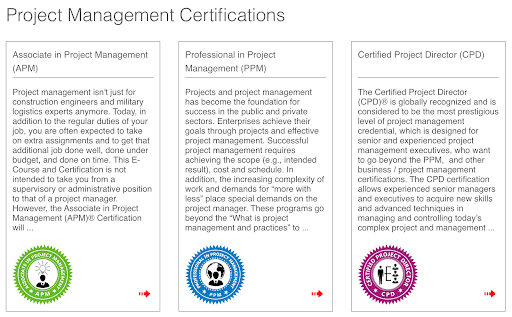
GAQM certifications are divided into three designations. (Source: GAQM)
The Global Association for Quality Management provides the option to take an e-course to prepare for the exam. The GAQMBok e-course tackles the core concepts, project life cycles, and resource management. Upon completion, participants will receive a GAQM Learner ID and be eligible for the exam.
Candidates who do not pass the exam can retake it multiple times, but they must wait at least 14 days from the date of their previous attempt. Three packages are available, allowing you to choose from 20, 40, or 240 days of validity for the exam voucher.
4. CompTIA Project+
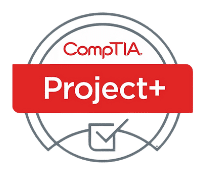
CompTIA Project+ is the only project management certificate program specifically designed for IT professionals seeking to demonstrate entry-level skills in managing smaller projects. The exam covers four domains: project management concepts, project lifecycle phases, tools and documentation, and the basics of IT and governance.
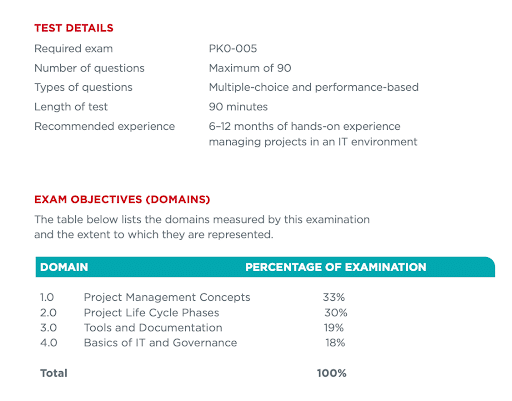
CompTIA Project+ documents the essential knowledge and skills required for the certification exam. (Source: CompTIA)
Depending on the training package selected, candidates can access a range of preparation resources, such as study guides, virtual labs, instructor-led training, and self-paced lessons. These training tools offer valuable knowledge when dealing with project constraints, change management, and cost control.
Similar to APM, the CompTIA Project+ is one of the few online project management certification courses that don’t require renewal.
5. PRINCE2 Foundation

The PRINCE2 is a project management methodology that emphasizes control, organization, and process-based frameworks. It offers a range of project management training courses to help candidates develop the skills necessary to manage projects effectively using the PRINCE2 principles.
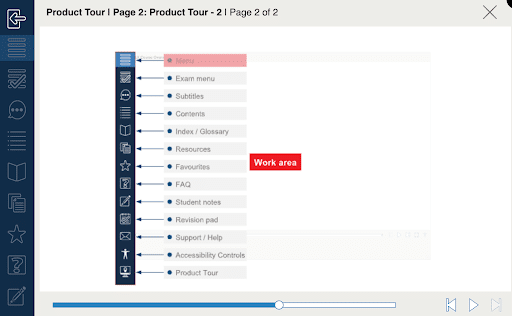
PRINCE2 offers a free demo on how to use its course material. (Source: PRINCE2)
The PRINCE2 Foundation course, designed for those seeking an entry-level qualification, covers the core concepts, themes, and processes of this methodology. It teaches how to consistently deliver projects on time and within budget, manage risks, and address potential issues.
PRINCE2 certification courses are available in various delivery methods to suit different learning styles, including online learning, classroom sessions, blended learning, and virtual workshops. Each option comes with different price points.
6. Master Project Manager
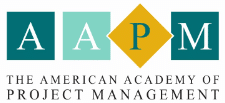
The American Academy of Project Management (AAPM) issues the Master Project Manager certification to senior-level project managers who wish to highlight their leadership skills and advanced project management expertise. Earning this certification signifies the completion of graduate-level project management education and extensive experience in managing projects both regionally and globally.
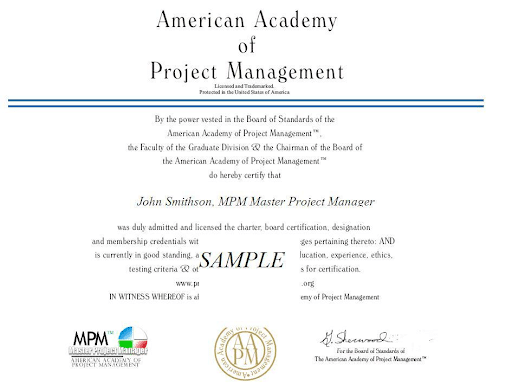
A certification for Master Project Manager from the American Academy of Project Management.
The MPM course uses three training styles: presentations, practical exercises, and interactive group discussions. Its course curriculum consists of four modules: work breakdown structures, quality management, negotiation strategies, and stakeholder management.
Project managers with over three years of industry experience, an accredited degree, and continuing education credits may apply for MPM Certification by submitting their resume to the board.
7. Certified ScrumMaster (CSM)
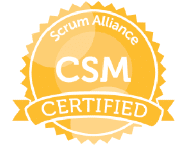
The Certified ScrumMaster (CSM) offers an in-depth training program on Scrum, an agile methodology designed for managing projects through the iterative development of products, with a focus on delivering high value. A CSM course is based on three learning objectives: the scrum concept, core competencies, and service to the scrum team, product owner, and organization.
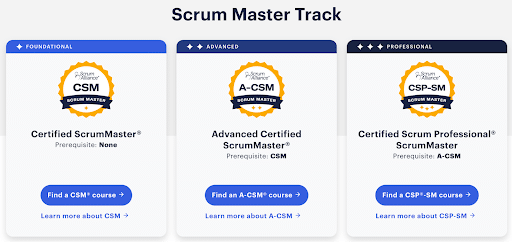
Choose any role in the Scrum Master Track that you wish to progress. (Source: Scrum Alliance)
The Scrum Alliance offers a library of CSM courses so you can choose your preferred learning format, date, coach, and Scrum Master Track credential. A course typically spans two to three days, followed by an online multiple-choice exam.
Tips for Completing a Project Management Course
Completing certifications for project management can be a pivotal step in advancing your professional career. Whether you aim to build your credentials or enhance your skills, a systematic approach can help you navigate the course effectively. Here are some tips to help you prepare and face your certification exam with confidence.
- Document your project experience: Certifications have strict eligibility requirements in the number of months you spend leading projects. You’ll want to document these experiences and break them down into timelines to ensure you meet the criteria and stand out.
- Use learning materials: Organizations that offer certification courses typically include official study guides in their training packages. You may also put together a list of study materials to diversify your knowledge sources and get ideas on how to answer scenario-based questions.
- Take practice exams: Online learning platforms like Udemy and Coursera offer practice exams that replicate the format, content, and difficulty level of the actual exam. By taking these tests, you’ll be familiarized with the questions you might encounter and identify which areas you need further study.
- Expand your network: Building connections within your niche allows you to gain learning experiences from professionals facing similar challenges in career development. You can also find experts with a wide array of project experience who you can consult about project trends and industry knowledge.
Frequently Asked Questions (FAQs)
The Project Management Professional (PMP) is the most globally recognized certification as it is known for its difficulty in meeting rigorous requirements for education and project management experience. Organizations have a high demand for PMP-certified holders as it validates a candidate’s level of proficiency and education in managing and leading projects.
Deciding between CPM or PMP depends on your career objectives and the specific requirements of your company or industry. A PMP certification works for project managers seeking higher-level project management roles in various industries. A Certified Project Manager (CPM) certification, on the other hand, is ideal for project managers wanting to validate their project management expertise in a niche.
The level of difficulty varies depending on the candidate’s previous project management experience and the level of preparation they did before the exam. According to the Certification Academy, the PMP exam has a passing rate of around 60%[1] on the initial attempt. It’s worth noting that the PMP doesn’t require memorization skills but your ability to apply your theoretical knowledge to complex scenarios.
Bottom Line
The best project management courses for small businesses award industry-recognized certifications that validate an individual’s skills, experience, and knowledge of managing projects efficiently. These certifications help project managers demonstrate competency and build their professional credibility.
Reputable online project management certification courses are available from the Project Management Institute and the American Academy of Project Management at affordable prices, making it easy for entry-level professionals to maintain their credentials without straining their budgets. Check out our course recommendations if you’re ready to advance your career.
Reference:
[1]Certification Academy